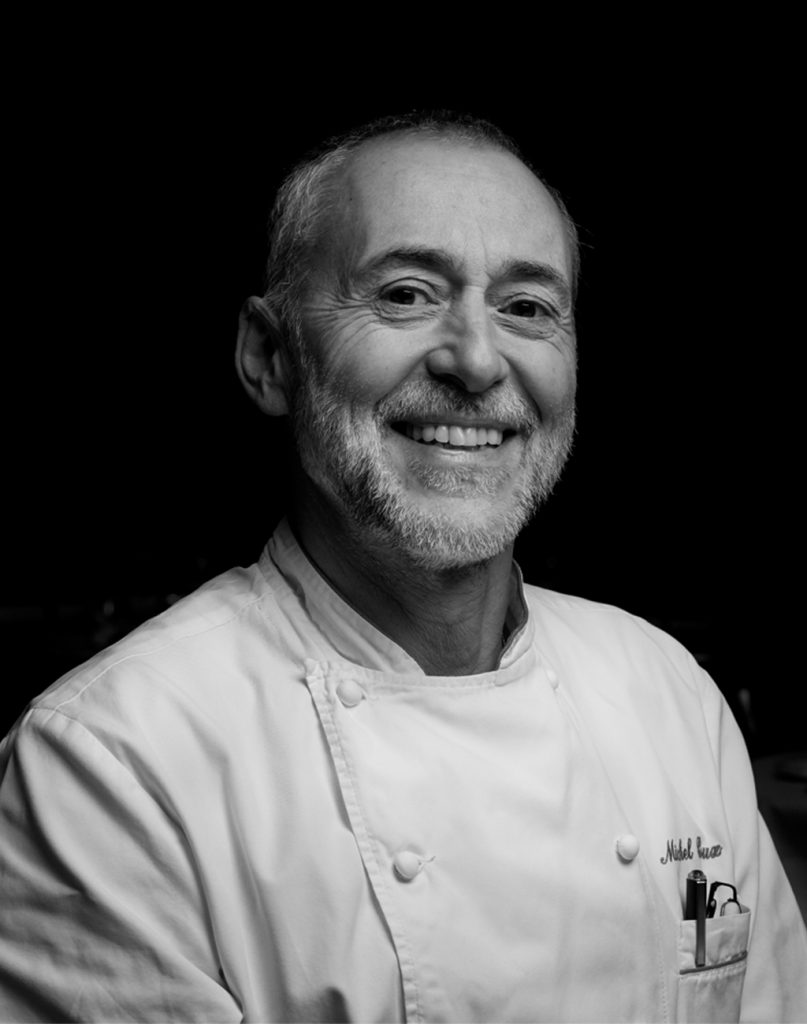
in Spirit
Elena Brower
"I learned that I don’t have to stay in something unless my heart is in it."

in Spirit
"I learned that I don’t have to stay in something unless my heart is in it."

in Food
"It’s about getting the message of your style, food and concepts out there."
Michel Roux Jr. is a master chef who sits quite comfortably at the helm of a 60 year old legacy. Since opening its doors in 1967, his Michelin starred restaurant Le Gavroche has championed proud tradition and devoted its cuisine to the principles of haute cuisine. In the face of the frenetic cycles of modern dining, the chef-restauranteur offers his opinion on celebrity, fast food and the invigorating influence of competition.


Michel Roux Jr is heir and steward to a noble culinary inheritance – the Roux legacy. Dubbed the godfathers of British haute cuisine, both his father Albert Roux Jr. and uncle Michel Roux Sr. transformed the culinary scene with their sophisticated take on French gastronomy. Both patriarchs founded an empire built on an impeccable taste for classicism paired with a profound technical appreciation for the lineage of high french cooking. Together with their particular eye for discovering and nurturing talent, their Sloane Square gem Le Gavroche also spurred a new wave of renowned chefs that include Gordon Ramsay, Marco Pierre White and Marcus Wareing to name a few. Today, the mythology of these men has clear permanence in the vision of its current director, Michel Roux Jr. whose contemporary direction simultaneously embraces the nostalgic perfection of the fine dining experience, whilst celebrating the invigorating possibility of modern reinvention.
I prefer good food that is simply cooked and that you can recognise on the plate.
Michel Roux Jr.
Michel Roux Jr: I don’t consider myself a celebrity chef and I don’t particularly like that title or moniker. Celebrity chefs are chefs who spend more time on television than they do in the restaurant, and most don’t have a restaurant. I’m very careful to pick and choose the television that I do because I don’t want to fall into the trap of being that celebrity chef. First and foremost I am a chef and restaurateur. This is where I feel the most at ease and the happiest. I enjoy the television work that I’ve done, especially things like Masterchef or Tried and Tested because although it’s entertainment, there’s a serious angle to it too. I’ve enjoyed some of the other jobs I’ve done like working with disabled children and trying to get them into work in the kitchens (Kitchen Impossible), but the television work is really a by-product of who I am and what I do day-to-day as a chef.
MRJ: I think media now, and particularly social media, is very important for most businesses, not just in the cheffing world. If you look at food photography or the “food porn” on Instagram, it is a very important part of a business. It’s about getting the message of your style, food and concepts out there.
MRJ: Absolutely. That’s why we need to evolve and keep banging the drum saying, “we’re still here, we’re still relevant.” At Le Gavroche, because we’ve been here for 50 years, we don’t get reviewed anymore. We get lifetime achievement awards or great classic awards, but critics like Jay Rayner won’t come and review here because we’ve been around forever. He wants to review the new restaurants, he wants to be the first one to review something that’s new. So yeah, we get recognition, but we don’t get awards for being the new kid on the block.
MRJ: Sometimes I get customers saying, ‘oh, well, I didn’t particularly like the style of your food.’ Well you know what? That’s what makes the world so wonderful- every place is different! You’ll get customers that say, ‘I ate at The Fat Duck and it was this and it was that’. Well, The Fat Duck is The Fat Duck, Le Gavroche is Le Gavroche! I’m sure there are customers that go to The Fat Duck and say, ‘we were at Le Gavroche’. But that’s the way it should be. Every restaurant should have its own aura, its own identity.
MRJ: I prefer good food that is simply cooked and that you can recognise on the plate. I hate it when I have to ask, ‘what the heck am I eating?’. You’ll order the scallops and you only get a single slice.
MRJ: Back in the 60’s and 70’s, food wasn’t great in Britain. If you were to walk down a supermarket aisle you’d be astonished at the poor ingredients that were there- just the lack of ingredients. You wouldn’t be able to find olive oil. That’s just basic now isn’t it? Even with butter, there was only a couple of kinds. Now look at the dairy produce. You look at an aisle now with dairy and it just goes on forever.
MRJ: I was very fortunate as a young child, we were surrounded by great ingredients. It wasn’t lavish food. It wasn’t expensive by any stretch of the imagination, but it was handmade and homemade. At my school, a lot of kids took packed lunches. Whilst most of them had sandwiches with marmite, a packet of crisps and a Mars bar, mine would have stinky camembert, some garlic sausages, and fresh fruit.
MRJ: For me, my idea of fast food is an egg or an omelette. That’s fast. It’s nutritious and delicious.
MRJ: McDonald’s. I can pin that down to the month and year – it was October ‘88 or ‘89. That was my last McDonald’s. It wasn’t because it was bad, I just didn’t like it. It was one in Watford. I was driving back from the North, it was about 1 am in the morning and I was just starving. I had to eat something and it was the only thing open. I’m not anti-McDonald’s. I’m not anti-burgers or fast food, I just don’t like it!
MRJ: I really, really do enjoy long distance running.
MRJ: People say that the era of fine dining with the white linen and all of that is finished. I don’t believe it. I think there will always be a place for that kind of luxury. We all have moments where we want that particular kind of luxury- to feel cosseted and made to feel special. I’m all for democratising. I’m all for casual dining, and the scene in Britain is amazing. There are some really quality restaurants at reasonable prices, which is fantastic. But there will always be places like Le Gavroche.
Michel Roux Jr was born in 1960 in Pembury, Kent, where his father worked as a private chef. Deciding to follow in his father’s footsteps, he left school at 16 for the first of several challenging apprenticeships. Following further training under Nouvelle Cusine pioneer Alain Chapel, Roux Jr became Sous Chef at the world famous, family-owned Le Gavroche where he worked under his father and uncle. He later went on to work with renowned chef Pierre Koffman at La Tant Claire in Chelsea and later at the Mandarin Hotel, Hong Kong. Following his father’s retirement in 1993, Roux Jr took over La Gavroche where he continues to work today alongside his role as a judge and presenter on the BBC’s prime-time show Masterchef: The Professionals. Visit Le Gavroche’s site here for more information.

Article from the issue :